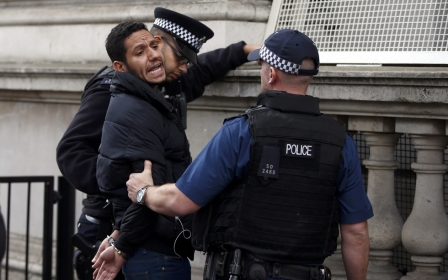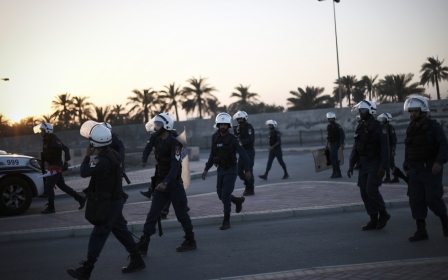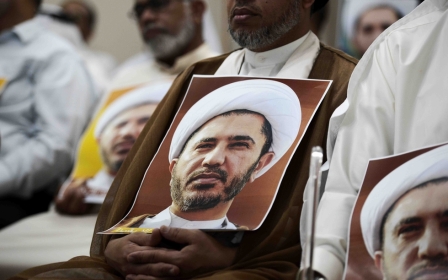Wife and baby of Bahraini rights activist on 'travel ban' after London protest
The family of a high-profile human rights campaigner have been blocked from leaving Bahrain, just days after he was arrested at a protest in London against the Gulf state’s king visiting Downing Street.
Duaa Alwadaei, 25, and Yousif Alwadaei, the wife and son of London-based campaigner Sayed Alwadaei, were detained at Bahrain International Airport and questioned for seven hours on Thursday as they tried to board a flight to London.
Mr Alwadaei, a Bahraini exile and long-time critic of the Bahraini government, said his wife was left “terrified” after she was dragged across the floor of the airport.
He also claimed that she was beaten by two female police officers when she refused to accompany them into custody, and that she was interrogated over his role in the Downing Street protest, during which campaigners threw themselves at King Hamad's official car. He also said that she was threatened with further detention if she spoke out over her treatment.
Campaigners were quick to attack the detention as an attempt at "retribution," with Reprieve and Human Rights Watch both issuing statements condemning the actions of the Bahraini security services.
The tiny but strategic Gulf state has been criticised in recent months by both groups for imposing travel bans on its opponents.
“While King Hamad is receiving the red carpet treatment in the UK, his goons in Bahrain are terrorising Sayed Alwadaei’s wife and their infant son, preventing them from leaving the country, and issuing unveiled threats against their families, “ Nick McGeehan, a Bahrain researcher at Human Rights Watch, said.
The questioning and alleged maltreat of Mr Alwadaei’s wife and the apparent mistreatment of his son, both of whom have a legal right to remain in the UK, will likely prove embarrassing for the British prime minister as it it comes after the campaigner, who has written for Middle East Eye, was briefly arrested on Wednesday outside Downing Street.
On Wednesday, MEE reported that he was detained briefly for attempting to disrupt a meeting between Prime Minister Theresa May and the king of Bahrain, Hamad bin Isa Al Khalifa. King Hamad also met with the UK's Queen Elizabeth during his visit to Britain.
The case comes ahead of Monday’s sentencing of Nabeel Rajab, one of Bahrain’s most high-profile human rights activists, who was sentenced to 15 years in prison over tweets he sent condemning torture in Bahrain’s prisons and the country's role in the conflict in Yemen.
Bahrain, which is dominated by the ruling Al Khalifa family, has faced international censure for a rights crackdown that has seen the arrest of opposition figures, the stripping of citizenship from the country’s highest Shia religious authority, Sheikh Isa Qassim, and the dissolution of the main opposition party, al-Wefaq.
Mr Alwadaei, who is director of advocacy at the London-based Bahrain Institute for Rights and Democracy (BIRD), is a fierce critic of the government in Manama and has addressed dozens of events in the UK, the US and Europe.
He has been a regular critic of the government since he was granted asylum in the UK, after he was imprisoned and tortured for his role in Bahrain's 2011 pro-democracy protests.
In a statement provided to MEE, Mr Alwadaei said his wife initially passed through airport security on Wednesday but was stopped at the gate and told she was on a “travel ban” list.
He said: “She was told they are coming after my family, asked her about my brothers, sister and parents whether she knows [knew] about my plans for the king's visit."
Mr Alwadaei said his wife was “dragged” and “beaten” by female police officers when she refused to leave to accompany officers away from the airport.
He added: “Most questions were about me. About my work, people I know, friends. She was asked repeatedly about the attack against the king and whether I had told her anything about it.”
A spokesperson for Bahrain’s embassy in London denied allegations of mistreatment, suggesting the claims had a “political agenda”.
They said: “Upon her departure at Bahrain's airport to her London destination, Mrs Alwadaei was briefly detained for questioning, searched and released. At no time was she abused or mistreated by authorities. It bears noting that the Office of the Ombudsman is available to anyone who feels their rights have been abused and will open an investigation into matters brought to their attention."
Pressure group Reprieve said it was “seriously concerned” about the case. 0
“Freedom of expression might be banned in Bahrain, but the British government cannot allow Bahrain to punish people who demonstrate in the UK against human rights abuses such as torture and executions. Duaa and her baby must be allowed to leave Bahrain immediately and return to their home in London with Sayed,” said Maa Foa, one of the group’s directors.
Mr Alwadaei said that his infant son Yousif was detained alongside his wife, despite pleas for him to be released into the care of his grandmother. The 18-month-old also holds a US passport, prompting questions at the US State Department’s daily briefing on Friday.
His son also became ill after being left with no food during the ordeal, claimed Mr Alwadaei, who was rendered stateless in 2015 when Bahrain stripped him of his citizenship.
Duaa was released after seven hours in detention, during which she was told she could face three years in prison for insulting a police officer, Mr Alwadaei added.
It is unclear if she will face any charges in Bahrain or if she will now be allowed to travel to the UK.
The embassy spokesperson added: “Bahrain remains committed to upholding the sanctity of civil liberties and human rights and hence takes all accusations of mistreatment extremely seriously. The government encourages all such complaints to be referred to the relevant independent institutions for investigation. The Ombudsman and the Special Investigation Unit are mandated with dealing with such issues.”
Middle East Eye propose une couverture et une analyse indépendantes et incomparables du Moyen-Orient, de l’Afrique du Nord et d’autres régions du monde. Pour en savoir plus sur la reprise de ce contenu et les frais qui s’appliquent, veuillez remplir ce formulaire [en anglais]. Pour en savoir plus sur MEE, cliquez ici [en anglais].




